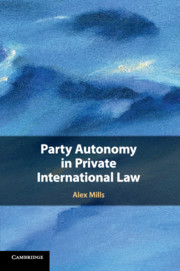Book contents
- Party Autonomy in Private International Law
- Party Autonomy in Private International Law
- Copyright page
- Dedication
- Contents
- Acknowledgements
- 1 Introduction
- 2 Historical and Theoretical Foundations of Party Autonomy
- 3 Choice of Court Agreements: Effects and Effectiveness
- 4 Choice of Court Agreements and Non-Contractual Claims
- 5 Limits on Party Autonomy in Choice of Court
- 6 Arbitration Agreements
- 7 Choice of Law in Contract
- 8 Choice of Law in Non-Contractual Relations
- 9 Limits on Party Autonomy in Choice of Law
- 10 Choice of Non-State Law
- 11 Conclusions
- Bibliography
- Index
10 - Choice of Non-State Law
Published online by Cambridge University Press: 31 July 2018
- Party Autonomy in Private International Law
- Party Autonomy in Private International Law
- Copyright page
- Dedication
- Contents
- Acknowledgements
- 1 Introduction
- 2 Historical and Theoretical Foundations of Party Autonomy
- 3 Choice of Court Agreements: Effects and Effectiveness
- 4 Choice of Court Agreements and Non-Contractual Claims
- 5 Limits on Party Autonomy in Choice of Court
- 6 Arbitration Agreements
- 7 Choice of Law in Contract
- 8 Choice of Law in Non-Contractual Relations
- 9 Limits on Party Autonomy in Choice of Law
- 10 Choice of Non-State Law
- 11 Conclusions
- Bibliography
- Index
Summary
- Type
- Chapter
- Information
- Party Autonomy in Private International Law , pp. 491 - 520Publisher: Cambridge University PressPrint publication year: 2018



